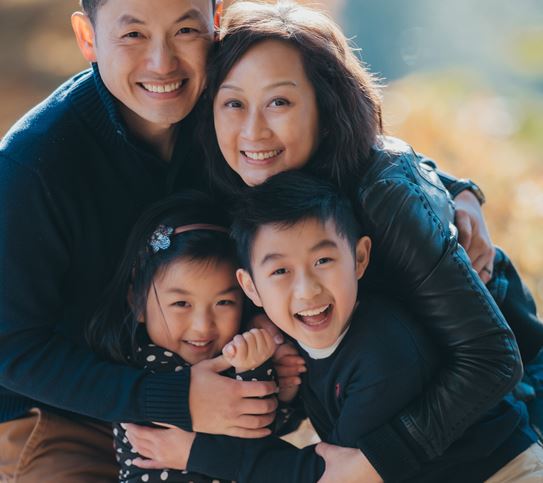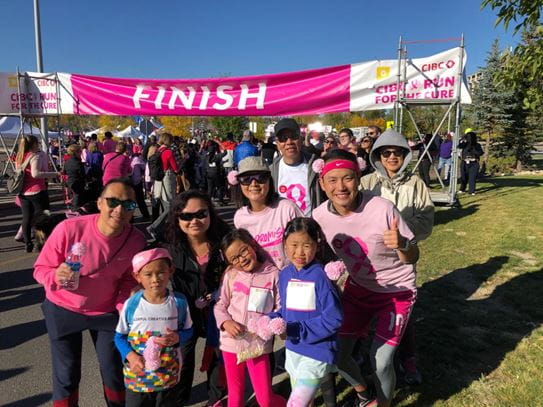In 2016, Vivian Chu was diagnosed with ductal carcinoma in situ (DCIS), stage 0 breast cancer, at 35 years old. 30 years earlier, Vivian’s mother was diagnosed with the same type and stage of cancer. While she was nervous, Vivian was confident that she would overcome the cancer, just like her mother. After going through a bilateral mastectomy, Vivian did not need any further treatment. She believed that would be the end of her cancer experience.
The following year, Vivian started feeling pain on the left side of her chest, where the cancer was initially found. Despite having a mastectomy, an ultrasound showed more DCIS. After going through another surgery, Vivian was told she was clear again. She had a great year – her kids were growing up and she picked up a part-time job.

Treatment and support for the spread of cancer
However, in late 2018, Vivian noticed some unusual symptoms – a coarse voice, weight gain and bloating. A CT scan revealed that her breast cancer had metastasized, or spread, to her liver. In January 2019, Vivian was diagnosed with stage 4 liver cancer.
“It was like a lightbulb moment that told me to shift my focus to my family with whatever time I have left,” Vivian says. “My husband and I had thought I’d go back to work once both our kids were in school. That was our ideal plan, but it didn’t work out like that after the metastasis.”
The metastasis led Vivian to do more research because she knew she would have to live with cancer. During chemotherapy, she learned about support from the Canadian Cancer Society (CCS). She received a wig from the CCS Wig Bank program, learned about Cancer.ca while researching her diagnosis and found CancerConnection.ca, CCS’s online peer support program where she was able to read discussions from people with similar cancer experiences.
After 10 weeks of treatment, Vivian’s scans came back clear and she returned to her life, spending time with family and participating in cancer fundraising campaigns. But later that year, she could not keep any food down. She returned to the ER, where an MRI displayed several lesions in her brain.
“I seriously thought I was going to be gone soon because the cancer had gone to my brain,” Vivian says. “The radiation oncologist said very quietly that my prognosis was a year, maybe a year and a half.”
After 10 days of whole brain radiation, Vivian’s brain scan returned clear. As of late 2019, Vivian has been clear of cancer from the neck down. A few lesions have been found and treated, but her day-to-day life hasn’t been affected.
Advocating for advanced research
When Vivian learned about the Canadian Cancer Society CIBC Run for the Cure, she knew she wanted to participate to fundraise for metastatic breast cancer research. After the cancer spread to her brain, Vivian knew the time she had left might be limited. Despite still being in recovery, Vivian attended CIBC Run for the Cure that year.
When I found out not a lot of research is done on metastasis, I was quite upset. There’s no way to track how many people have an initial diagnosis and then have reoccurrence, so I really wanted to change that.
Vivian has participated in the Run every year with her team, WeareFamilui MBC, the top fundraising team in 2022. As of 2023, they have raised over $25,000 for the Run.

“It’s an amazing day knowing that some of us may not survive it, but there are still so many of us trekking through it and making the most of our lives. Seeing how much support there is for people like us who are sick is very comforting,”
Vivian is currently living with cancer and advocates for continued research into metastatic breast cancer.
Since I was diagnosed, there has been a lot of progress made in research. Knowing there is ongoing research and new treatments is encouraging. Every dollar matters. It doesn’t matter how much you can raise. All the efforts made with our donations will eventually make an impact.

Help change the future of breast cancer
October marks Breast Cancer Awareness Month, an important time to raise awareness, promote prevention and screening, help fund breast cancer research and support people affected by the disease.
Breast cancer is the most commonly diagnosed cancer and the second-leading cause of cancer death among women. This year alone, it’s estimated that 30,800 people will be diagnosed with breast cancer in Canada.
As Canada's largest national cancer charity and the largest national charitable funder of breast cancer research, the Canadian Cancer Society works tirelessly to help save and improve lives. A tremendous amount of progress has been made so that breast cancer treatment is less invasive and more effective, but we need your continued support to ensure those facing breast cancer live longer, fuller lives.
Donating to the Canadian Cancer Society during Breast Cancer Awareness Month is a powerful act of hope and compassion. Your breast cancer donations will help fund world-leading research and life-saving advancements in treatment, giving hope to people like Vivian.
Help us change the future of breast cancer today.
